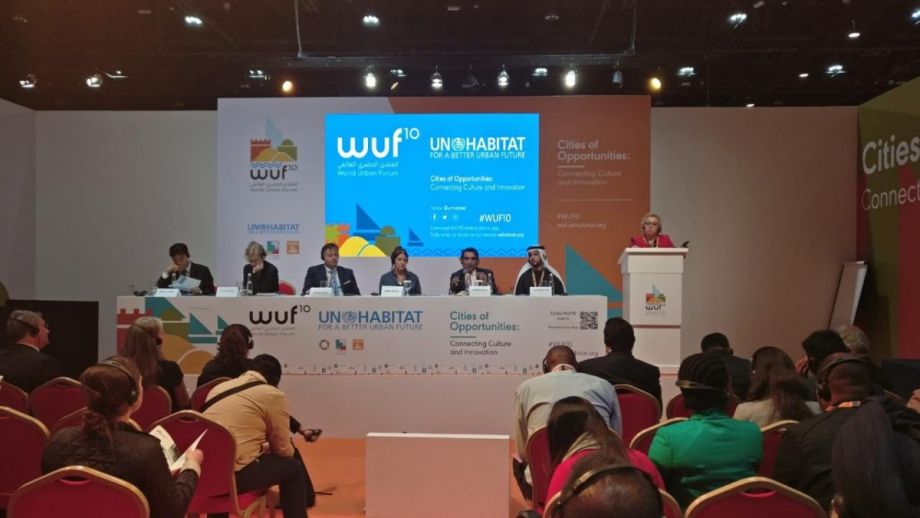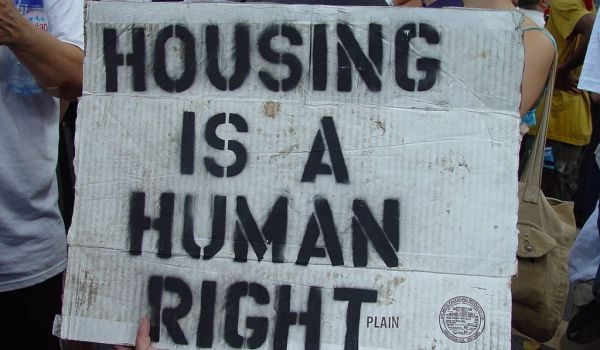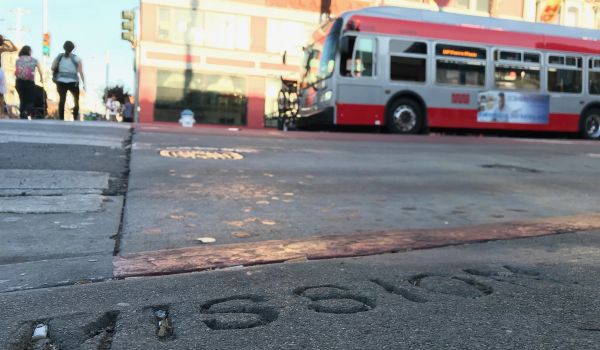With a 16-year career providing housing in South Africa’s Western Cape, trained civil engineer Phila Mayisela is no stranger to giving presentations in front of ministers and other high-ranking public officials. She directs the province’s Department of Human Settlements, which has been struggling to make a dent in the 500,000-person backlog for proper housing in a region riddled with the township legacy of apartheid, especially in greater Cape Town.
But when the strict seven-minute clock began ticking as she stood in front of six financiers last week at World Urban Forum 10 in Abu Dhabi to pitch them on investing in a $804 million housing scheme, even the seasoned civil servant felt the pressure.
“It was nerve-racking,” she told Next City after the high-stakes pitch session.
Mayisela had traveled to Abu Dhabi looking for private-sector capital to jumpstart the Southern Corridor Integrated Human Settlements Programme, which aims to deliver some 50,000 housing units southeast of Cape Town in an area home to eight of the metro area’s largest townships.
For Mayisela, the math is simple: At current government funding rates of 2 billion rand (US$133.5 million) per year, her department can only provide 18,000 people per year with subsidized housing. She estimates that it will take 100 billion rand (US$6.7 billion) annually to close the metro area’s enormous housing deficit.
So when she got wind last fall of a new initiative from UN-Habitat to match cities with investors, like a spin on the popular reality TV show “Shark Tank,” Mayisela signed up. The Cities Investment Facility, which debuted at World Urban Forum 10, hopes to match Mayisela — and dozens of other city officials dealing with expensive urban infrastructure needs — with the world of private finance, which is increasingly looking for so-called triple bottom line investments that provide a financial return while also offering an environmental and social return. Its backers aim for $500 billion in investment by 2030 with 10-15 percent returns on investment.
Mayisela is used to the latter two metrics — those are the kinds of questions her minister asks — but the former is new territory. “The investors are asking for market-related returns: If I invest, what’s in it for me?” she explained. “You have to try and pitch it so that they see value.”
In the case of Western Cape, she believes there is a market opportunity in providing affordable housing, which in South Africa’s case corresponds to low-income families who aren’t so poor as to qualify for fully subsidized housing. To that end, the department has previously released land for affordable housing at nominal cost to the private sector. Thus far, South African investors have put some 603 million rand (US$40.2 million) into the scheme.
“All the revenues are accrued to the investor,” she said. “[The investors at World Urban Forum] were quite relieved to see that.” Indeed, Mayisela said all six investors that reviewed her pitch followed up with some degree of interest.
Such demonstrations of bankability are music to the ears of investors. Unlike the reality TV show, where investors known as “sharks” show no mercy as they interrogate entrepreneurs before deciding on the spot whether or not to take a stake in their company, the Cities Investment Facility is more collaborative than predatory. It brings in financiers when projects are in their early stages to help cities think about the financial constraints and potential returns from new proposals.
“We’re very good at designing the most beautiful master plans, but who’s going to pay for it?” said Neil Khor, special advisor to UN-Habitat’s executive director, who has straddled the worlds of urban development and private capital. He previously ran Think City, an urban redevelopment organization, which as a subsidiary of Khazanah Nasional Berhard, Malaysia’s sovereign wealth fund, has long had an eye on bankability.
Ultimately, answering that fundamental financial question — what is the return on investment? — was the number one concern of the dozen financiers who spanned the world of private banking, family wealth funds, impact investment funds and multilateral development banks.
As one example, Henry Barclay, who advises family wealth funds at Barclay et al., unpacked a proposal from the Filipino national development authority charged with turning former U.S. military bases into productive assets. The pitch sought a $200 million investment in a pilot bus rapid transit system for New Clark City, a planned community about 110 km (68 miles) northwest of Manila that hopes to avoid the capital’s chaotic traffic headaches.
“They had proven that people want to use a bus, which is fantastic, but do people want to pay for their bus when there are other competing bus services?” he asked. “What happens if or when the other bus companies lower their prices?”
“[The cities] need to improve their business models and ensure that they are going to get the revenues that they think they will,” he said, acknowledging, “It is relatively new for municipalities to take a business plan approach.”
At least there was an obvious revenue stream for New Clark City. Other proposals were far more nebulous, like Pune, India, seeking $57.6 million in private investment to build out an 825-km (513-mile) bike lane network and a public bike-share system with 13,000 two-wheelers.
“It’s very difficult to quantify [financial impact] at the street or neighborhood level when you implement a project on public space or a bicycle lane,” conceded UN-Habitat finance specialist Marco Kamiya. “The aggregate of these will generate benefits.”
But where there were more clearly illustrated revenue streams, investors lurked like, yes, hungry sharks.
Ivan Ng is a Singaporean angel investor whose technology-heavy portfolio runs the gamut of more typical 21st century investments: HR tech, supply chain tech, health tech, and mobility tech. Although not one of the official investors giving feedback on stage, Ng sat in the audience collecting leads.
He was keen on a solar farm in Acapulco, Mexico, and a proposal from Sapucaia do Sul, Brazil, to upgrade street lights to LEDs.
While he readily acknowledged that bureaucrats making pitches to improve their cities hardly come across as potential unicorns — start-ups with $1 billion-plus valuations — he suggested that the world of private finance has an appetite beyond the next Uber or ByteDance for investments with the kinds of softer, not-exclusively-financial returns that don’t necessarily come from investments in tech startups.
“Yes, I’ve spent most of my time with young, dynamic, restless entrepreneurs but I also work very closely with a lot of family offices,” Ng said. “80 percent of ultra-high-net worth [individuals] in Asia-Pacific are all owned by family offices and the way they do business is something similar to this — but even more emotional.”
Our special correspondent Gregory Scruggs will be in Abu Dhabi to cover World Urban Forum 10, taking place February 8 through 13, 2020. To stay on top of the essential conversations and innovative solutions presented at WUF 10, sign up for Urban Planet, our global sustainability newsletter.

Gregory Scruggs is a Seattle-based independent journalist who writes about solutions for cities. He has covered major international forums on urbanization, climate change, and sustainable development where he has interviewed dozens of mayors and high-ranking officials in order to tell powerful stories about humanity’s urban future. He has reported at street level from more than two dozen countries on solutions to hot-button issues facing cities, from housing to transportation to civic engagement to social equity. In 2017, he won a United Nations Correspondents Association award for his coverage of global urbanization and the UN’s Habitat III summit on the future of cities. He is a member of the American Institute of Certified Planners.





_920_614_600_350_80_s_c1.jpg)

_600_350_80_s_c1.JPG)










